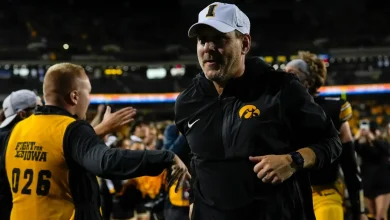Trump, Starmer, Netanyahu and other world leaders extend Diwali greetings

As millions of lamps illuminated homes and streets across India on Monday, marking the festival of Diwali, world leaders from the United States, Israel, Canada and the United Arab Emirates joined in the celebrations, extending warm wishes.
US President Donald Trump, Israeli Prime Minister Benjamin Netanyahu and several diplomats conveyed greetings that celebrated the essence of Diwali — the triumph of light over darkness and good over evil.
In a statement released by the White House, US President Donald Trump extended his greetings to all those celebrating the festival of lights.
“Today, I send my best wishes to every American celebrating Diwali — the ‘Festival of Lights,'” Trump said. “For many Americans, Diwali is a timeless reminder of light’s victory over darkness. It is also a time to bring families and friends together to celebrate community, draw strength from hope, and embrace a lasting spirit of renewal.”
He added, “As millions of citizens light diyas and lanterns, we rejoice in the eternal truth that good will always triumph over evil. To every American celebrating Diwali, may this observance bring abiding serenity, prosperity, hope, and peace.”
The message was reiterated by Kash Patel, Director of the Federal Bureau of Investigation (FBI), who posted on X: “Happy Diwali — celebrating the Festival of Lights around the world, as good triumphs over evil.”
The Indian Embassy in Washington also extended Diwali greetings, wishing “health, happiness and prosperity” to everyone on the occasion.
At the India House in Washington, the celebrations were attended by Sergio Gor, the US President’s Special Envoy, and Vinay Mohan Kwatra, India’s Ambassador to the United States. “Pleasure to host Ambassador and Special Envoy to the President Sergio Gor yesterday at India House for Diwali celebrations before his visit to India,” Kwatra wrote in a post.
NETANYAHU SENDS DIWALI WISHES TO PM MODI AND INDIA
Extending solidarity and friendship, Israel joined the global community in Diwali celebrations, with Prime Minister Benjamin Netanyahu sending his wishes to Narendra Modi and the people of India.
“Wishing my friend Narendra Modi and the people of India a very Happy Diwali! May the Festival of Lights bring hope, peace and prosperity to your great nation. Israel and India stand together — partners in innovation, friendship, defence and a brighter future,” Netanyahu said.
The State of Israel also issued an official message, saying, “As millions across India light their diyas to celebrate the victory of light over darkness, Israel extends warm wishes for peace, renewal and hope. From Jerusalem to Delhi and far beyond, may this festival inspire faith in a brighter tomorrow.”
Israel’s Foreign Ministry and its embassy in India shared similar greetings, with diplomats taking part in local festivities. Sara Yanovsky, Political Affairs Advisor at the Embassy of Israel in Delhi, wrote, “Wishing you a happy and meaningful Diwali. May the festival of lights bring joy and peace to you and your loved ones.”
Israeli diplomats even participated in diya and dcor shopping for the festival. “This Diwali, our diplomats went diya and dcor shopping! May our homes be filled with love and light, today and every day,” the Israeli Embassy in India posted.
The embassy’s spokesperson, Guy Nir, added, “Happy Diwali to all my Indian friends! May this Festival of Lights bring joy and prosperity to you all.” Diplomat Hadas Bakst said, “May the light of the diya shine on the strong friendship between India and Israel. Wishing you peace and prosperity.”
Israeli Ambassador to India Reuven Azar shared a video message saying, “Wishing all my Indian friends a joyful Diwali! May this special occasion illuminate your lives with good health and happiness. At this time, we also rejoice in the return of hostages and their heartfelt reunions with loved ones.”
CANADA, UK AND UAE JOIN IN CELEBRATIONS
Canadian Prime Minister Mark Carney also joined world leaders in conveying Diwali wishes. “Tonight, families and communities across Canada will light diyas and celebrate the triumph of light over darkness — of good over evil. Wishing everyone celebrating Diwali a joyful Festival of Lights,” he posted.
Tonight, families and communities across Canada will light diyas and celebrate the triumph of light over darkness — of good over evil.
Wishing everyone celebrating Diwali a joyful Festival of Lights. pic.twitter.com/VbNsVIlWt6— Mark Carney (@MarkJCarney) October 20, 2025
In the United Kingdom, Prime Minister Keir Starmer extended greetings to Hindu, Jain and Sikh communities across Britain. “Wishing Hindus, Jains and Sikhs across Britain a joyful and peaceful Diwali and Bandi Chhor Divas,” Starmer said in a message.
The United Arab Emirates Ambassador to India, Abdulnasser Alshaali, shared that Diwali had become a meaningful part of his life in India. “Diwali has been part of my journey in India from the very start, and as I celebrate my fourth one here, its warmth feels more special than ever. Wishing everyone happiness and prosperity,” he said.
India came alive with lights, colours and festivities as people celebrated Diwali with devotion and enthusiasm.
– Ends
With inputs from agencies
Published By:
Satyam Singh
Published On:
Oct 21, 2025
Tune In





